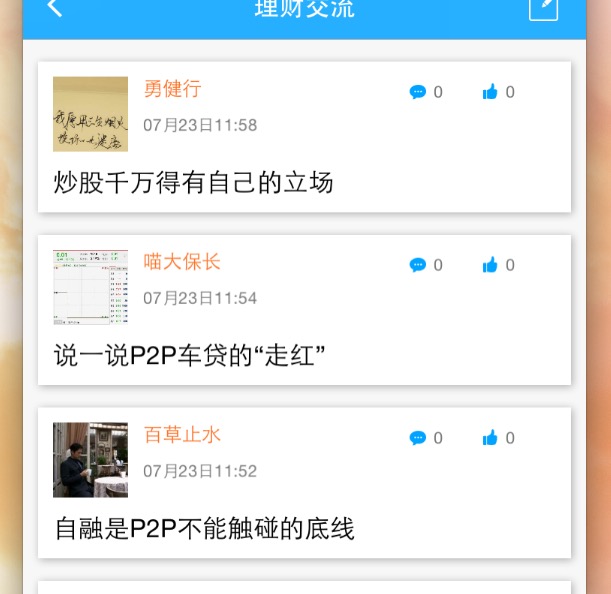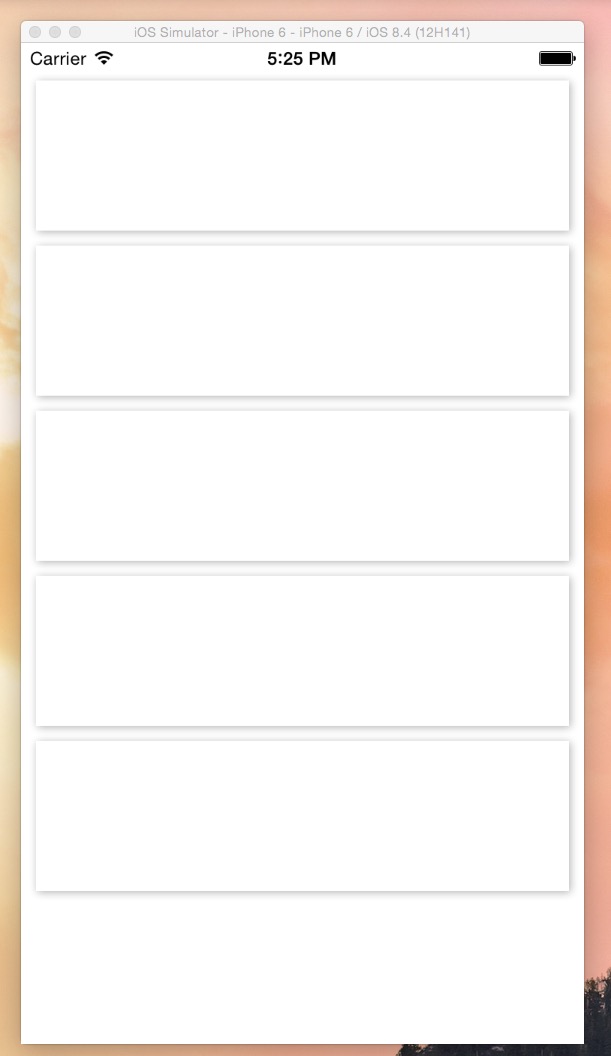iOS开发中tableViewCell的悬浮效果
2015-07-24 15:38
471 查看
其实很早就想写博客了,只是感觉自己的技术不行,写出来的东西技术性不强,写出来也没什么用,不过后来想想,写写博客记录开发中遇到的问题也不错....
今天我想写的是tableView的悬浮效果,因为我们公司最近在开发社区,就是和百度贴吧类似的,嵌套在应用中,而其中关于每一个的帖子要像这种效果

开始是做不出这种效果,就直接写个tableView算了,后来跟问了下做安卓的那边,原来是阴影的效果...
说到这里,相信好多同学都知道,好吧,我们开始上代码,首先是创建tableView,这个就不用多说了吧,这是创建tableView的.m文件
然后是自定义cell,自定义cell要注意因为要写出悬浮效果,所以我想的是给Cell加一层View,这个View的frame比Cell的contentView小一圈,在设置边框的阴影,就能写出悬浮效果了,这是自定义Cell的.m文件
运行起来的效果图,是不是棒棒哒

结束,第一篇博客就写到这里了,就算没人看(还是希望有人看的),我也会写下去的哦...
今天我想写的是tableView的悬浮效果,因为我们公司最近在开发社区,就是和百度贴吧类似的,嵌套在应用中,而其中关于每一个的帖子要像这种效果

开始是做不出这种效果,就直接写个tableView算了,后来跟问了下做安卓的那边,原来是阴影的效果...
说到这里,相信好多同学都知道,好吧,我们开始上代码,首先是创建tableView,这个就不用多说了吧,这是创建tableView的.m文件
#import "ViewController.h"
#import "DemoCell.h"
//屏幕宽度
#define SCREEN_WIDTH ([[UIScreen mainScreen] bounds].size.width)
//屏幕高度
#define SCREEN_HEIGHT ([[UIScreen mainScreen] bounds].size.height)
@interface ViewController () <UITableViewDataSource,UITableViewDelegate>
@property (nonatomic,strong)UITableView *tableView;
@property (nonatomic,assign)CGFloat height;
@end
@implementation ViewController
- (void)viewDidLoad {
[super viewDidLoad];
[self createTabelView];
}
- (void)createTabelView{
self.tableView = [[UITableView alloc] initWithFrame:CGRectMake(0, 20, SCREEN_WIDTH, SCREEN_HEIGHT-20) style:UITableViewStylePlain];
self.tableView.delegate = self;
self.tableView.dataSource = self;
self.tableView.separatorStyle = UITableViewCellSeparatorStyleNone;
[self.view addSubview:self.tableView];
}
- (NSInteger)tableView:(UITableView *)tableView numberOfRowsInSection:(NSInteger)section
{
return 5;
}
- (UITableViewCell *)tableView:(UITableView *)tableView cellForRowAtIndexPath:(NSIndexPath *)indexPath
{
//注意重用
static NSString *cellId = @"cell";
DemoCell *cell = [tableView dequeueReusableCellWithIdentifier:cellId];
if(cell == nil){
cell = [[DemoCell alloc] initWithStyle:UITableViewCellStyleDefault reuseIdentifier:cellId];
}
return cell;
}
- (void)didReceiveMemoryWarning {
[super didReceiveMemoryWarning];
}
- (CGFloat)tableView:(UITableView *)tableView heightForRowAtIndexPath:(NSIndexPath *)indexPath
{
return [DemoCell getHeight] + 10;
}
@end然后是自定义cell,自定义cell要注意因为要写出悬浮效果,所以我想的是给Cell加一层View,这个View的frame比Cell的contentView小一圈,在设置边框的阴影,就能写出悬浮效果了,这是自定义Cell的.m文件
#import "DemoCell.h"
#define SCREEN_WIDTH ([[UIScreen mainScreen] bounds].size.width)
#define SCREEN_HEIGHT ([[UIScreen mainScreen] bounds].size.height)
@interface DemoCell()
@property (nonatomic,strong)UIView *bgView;
@end
@implementation DemoCell
- (instancetype)initWithStyle:(UITableViewCellStyle)style reuseIdentifier:(NSString *)reuseIdentifier{
if(self = [super initWithStyle:style reuseIdentifier:reuseIdentifier]){
[self createUI];
}
return self;
}
//重点在这里
- (void)createUI{
//创建一个UIView比self.contentView小一圈
self.bgView = [[UIView alloc] initWithFrame:CGRectMake(10, 5, SCREEN_WIDTH - 20, 100)];
self.bgView.backgroundColor = [UIColor whiteColor];
//给bgView边框设置阴影
self.bgView.layer.shadowOffset = CGSizeMake(1,1);
self.bgView.layer.shadowOpacity = 0.3;
self.bgView.layer.shadowColor = [UIColor blackColor].CGColor;
[self.contentView addSubview:self.bgView];
}
+ (CGFloat)getHeight{
//在这里能计算高度,动态调整
return 100;
}
@end运行起来的效果图,是不是棒棒哒

结束,第一篇博客就写到这里了,就算没人看(还是希望有人看的),我也会写下去的哦...
相关文章推荐
- iOS开发命令集合
- IOS学习之蓝牙4.0
- 用CocoaPods做iOS程序的依赖管理-from 唐巧
- 百度云推送的ios证书配置
- iOS 在 Xcode 中重命名项目名称
- 模糊C均值聚类(FCM)算法(IOSDATA)+ c语言代码
- iOS编程学习
- iOS-获取系统的相册图片
- IOS7最新的系统漏洞
- iOS应用崩溃日志分析
- ios开发中遇到的各种错(一)
- iOS 图标、图形尺寸?
- iOS地图位置开发
- iOS 实现百度LBS定位
- IOS中获取各个文件的目录路径的方法和NSFileManager类
- iOS Sprite Kit教程之申请和下载证书
- IOS开发中的沙盒机制
- iOS 地图移动中心点获取
- iOS Sprite Kit教程之申请和下载证书
- ios7分辨率与适配
